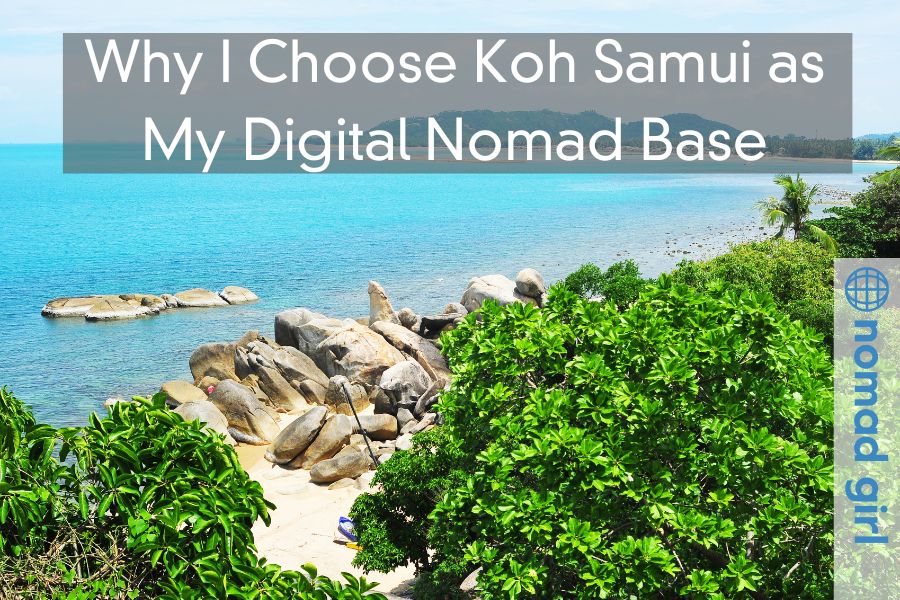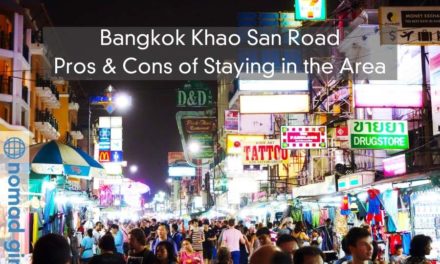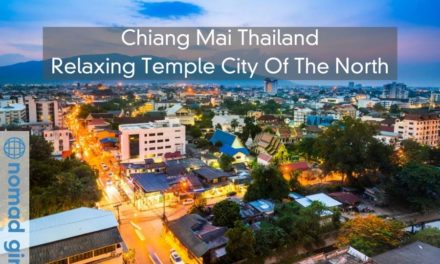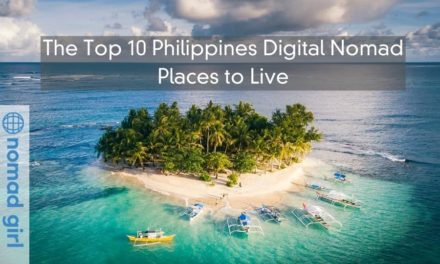I never imagined that Koh Samui, a picturesque island nestled in the Gulf of Thailand, would become one of my digital nomad home bases.
But, as life has it, sometimes the best decisions are the ones that fall into your lap by accident. Let me take you on a journey of how this tropical paradise became my chosen sanctuary, alongside my beloved Tuscany in Italy, but more on that in another article.
From Slowmad to Digital Nomad with Multiple Home Bases
For years, I embraced the slowmad lifestyle—staying in places for months at a time, soaking up the local culture like a sponge, and living out of suitcases like some travelling fashionista. Tuscany always offered me a taste of European luxury and history, but I was itching for something in Southeast Asia.
What I wasn’t so keen on anymore was the constant packing and unpacking, the hit-or-miss rentals from platforms like Airbnb and Booking.com, and the rising costs. Algorithm-driven rental spikes? No, thank you.
The slowmad lifestyle that I had clung to was starting to feel more like an expensive hobby than the enriching journey it used to be. I needed stable home bases that felt like…well, home. Koh Samui was never part of the plan—at least, not at first.
Southeast Asia Beckons – Choosing My First Home Base
The allure of Southeast Asia has always been strong for me. Vietnam, Thailand, and Bali were my top contenders when it came to choosing where to establish a base. Each of these places had its charm and frustrations, but in the end, the island vibes of Koh Samui won out.
Vietnam: The Land of Pho and Karaoke
Vietnam will always hold a special place in my heart. Its vibrant cities, hardworking people (especially the women), and amazing cuisine are nothing short of inspirational. I can never get enough of the Pho soups and hotpots—it’s like a warm hug in a bowl. Hoi An, with its ancient streets and riverside charm, was my favourite spot during my pre-pandemic days.
But despite my love affair with Vietnam, there were a few deal-breakers. The visa situation was a nightmare post-COVID, with constant visa runs, once a month that drained both time and energy. The tax situation was another issue—35% tax on income if I stayed more than 183 days. Sorry, not happening.
Oh, and let’s not forget the karaoke. Every. Single. Morning. At 7 am, no less! It was as if the entire country had decided to start their day by belting out distorted tunes at full volume, and when I complained the situation got worse, not like this one here though. Vietnam might have won my heart, but it couldn’t win my commitment.
Bali: Traffic and Torrential Rains
Bali, the digital nomad darling of Southeast Asia, was another strong contender. I’d been there several times, and it truly has everything—great food, yoga, surfing, and a lovely mix of Western comforts and local culture. It’s as if Bali was tailor-made for the digital nomad life. But two things drove me away: the traffic and the weather.
The traffic in Bali is enough to make even the most zen yogi lose their cool. A 30 km journey could easily take 90 minutes. The roads are narrow, and the constant motorbike congestion feels like a never-ending game of Tetris, where you’re the block trying to fit in between the chaos.
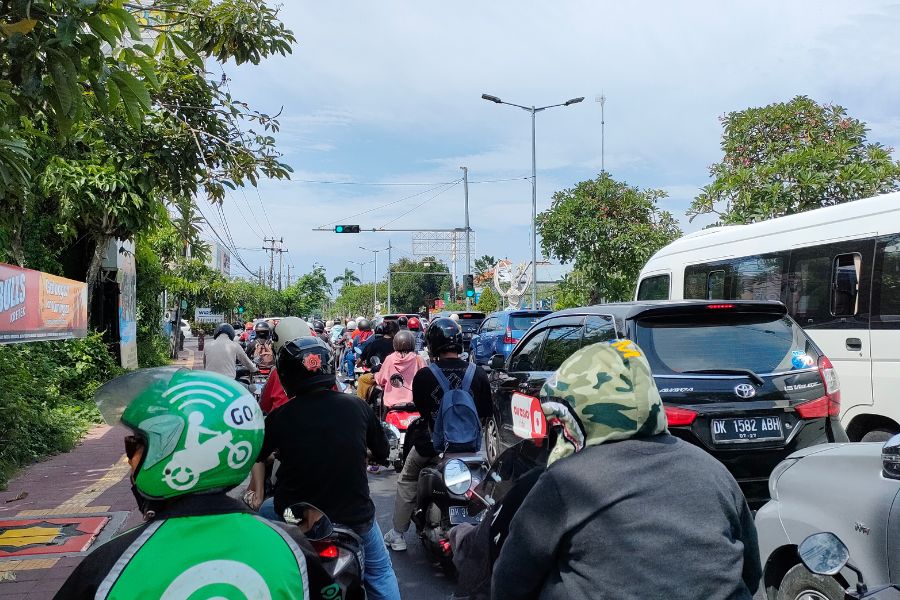
And then there’s the monsoon season, which conveniently overlaps with Europe’s winter months—just when I wanted to escape the cold! Torrential rains for half the year? Not ideal for someone looking to escape the gloom.
Thailand: My Long-Term Love Affair
Of all the countries I’ve visited, Thailand always held a special place in my heart. I had made 15 visits to Thailand before finally deciding to make it a permanent base. It already felt like a second home in so many ways. The food is unbeatable, the affordability makes it easy to live comfortably, and fast internet speeds make it ideal for digital nomads like myself.
But when I first visited Koh Samui in 2022, the visa situation was a little less straightforward. Frequent visa runs were required every 60 days, and extending your stay meant taking a trip to the immigration office. It was a bureaucratic hassle, especially for someone looking to put down semi-permanent roots. Alternatives existed, but they came with fees and a frustrating level of paperwork.
The tide turned in 2024, however, with the introduction of the Digital Nomad Visa, officially known as the Destination Thailand Visa (DTV). This low-cost, 5-year visa is now one of the best programs in the world for digital nomads. It’s almost as if Thailand realized it had become a mecca for remote workers and decided to roll out the red carpet. With the DTV, I could finally breathe a sigh of relief—no more visa runs, no more frequent trips to the immigration office. It was the final piece of the puzzle that made Thailand my official digital nomad home base.
Thailand also offers favourable tax benefits for those who stay long-term where only income remitted to Thailand is taxed.
Thailand 2024 Tax Tweak – Implications For Digital Nomads, Pensioners & Expats
Bangkok, with all its buzz and energy, is intoxicating but only in short bursts. Living there long-term would drive me mad.
Chiang Mai, although lovely, suffers from horrendous pollution during the burning season in March and April, when it becomes one of the most polluted cities in the world.
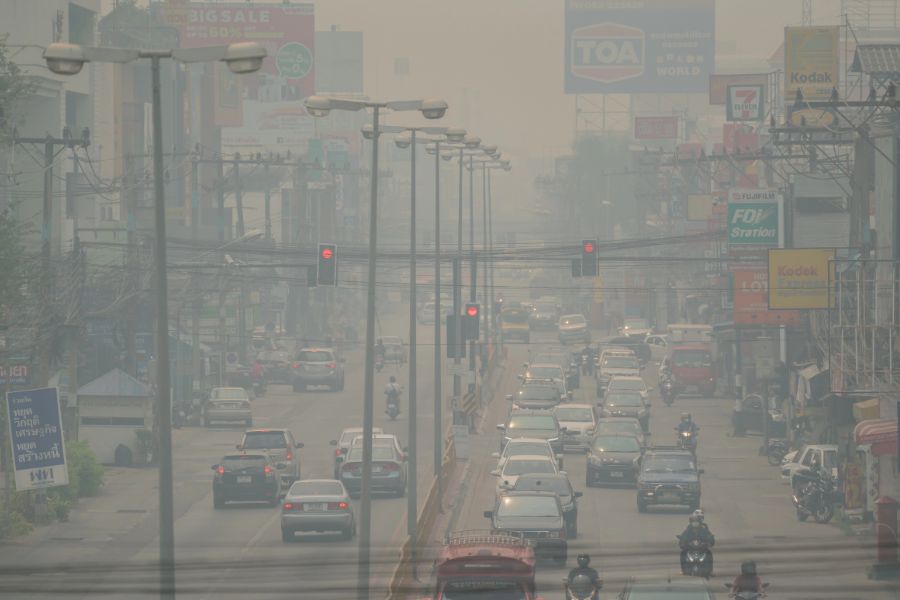
Chiang Mai smog
As for Phuket, while beautiful, it’s becoming overrun with tourists, and traffic there is heading down the same path as Bali.
So where did that leave me? Koh Samui, an island I had never set foot on before 2022. It seemed like an intriguing option, and I figured, why not give it a try?
The Accident That Was Koh Samui
In the autumn of 2022, I was living in Timisoara, Romania—a slowmad stop that had started to feel stagnant. With the war in Ukraine and the energy prices across Europe skyrocketing, I knew it was time to make a change.
My original plan was to head to Italy, but memories of high heating bills and poorly insulated houses during the winter months haunted me. Thailand suddenly seemed like the more financially sound option.
A friend who had lived on Koh Samui for years recommended I try the Plailem area, a quieter spot just five minutes from Choeng Mon Beach, one of the island’s gems. I booked a three-month rental from December to February and quickly fell in love with the place.
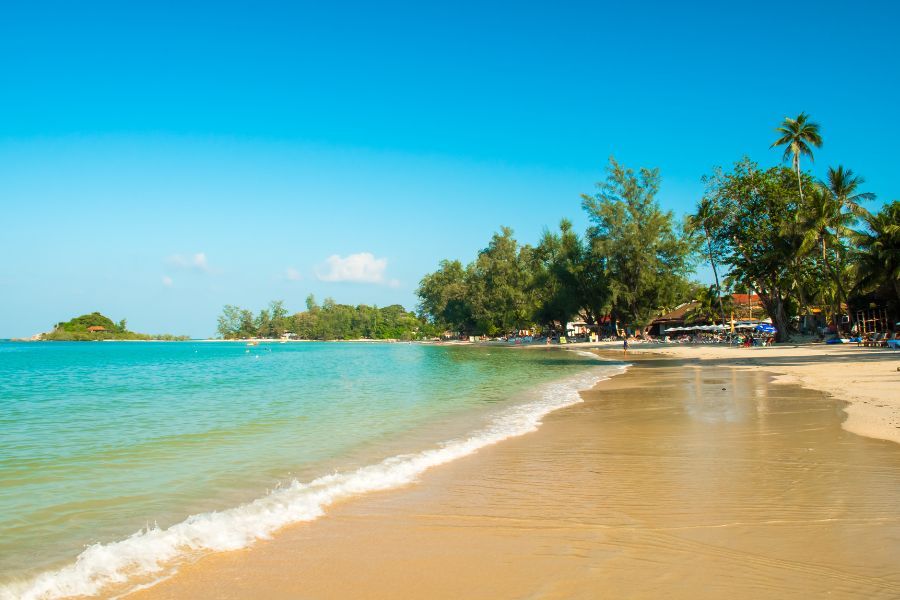
The two-bedroom townhouse had sea views, and was part of a complex with a communal garden, two pools, and a gym—all the things that make life comfortable, especially when you’re raising two kids like I am.
Koh Samui wasn’t packed with tourists, as Thailand had just reopened after COVID, but it was busy enough to feel lively. I had everything I needed within a 20-minute drive—food markets, shops, beaches, and most importantly, peace.
From Rental to Home
What began as a short-term rental soon evolved into something more. About two months into our stay, I found out that the townhouse was for sale. The real estate market was still a bit depressed from the pandemic, and the timing felt right. We loved the house, the area, and the island—so why not make it permanent?
Within two weeks, we had purchased the house, and I had transitioned from a slowmad to a proud homeowner in Koh Samui. The house, built in 2009, needed a bit of TLC—new paint, a kitchen renovation, fresh floors, and updated furniture. But I wasn’t afraid of a little hard work, especially when the result would be the perfect digital nomad base.
We extended our stay until September to oversee the renovation. Now, the house is a true haven—fast Wi-Fi in every room, a spacious European-style kitchen, a washing machine (an absolute must when you’re living long-term), and tons of storage space. It’s the kind of home that feels clean, clutter-free, and ready to handle the ebb and flow of digital nomad life.
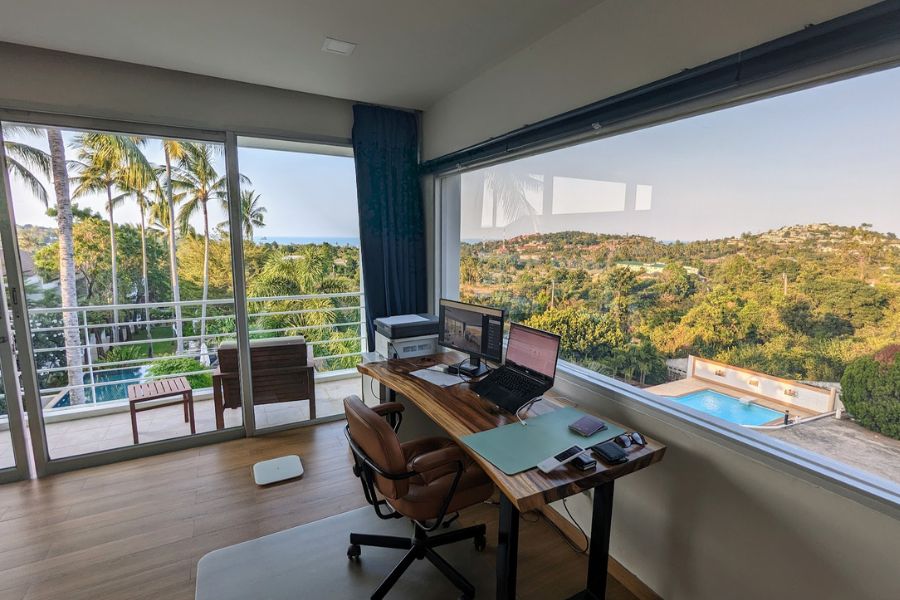
Bliss, my working environment in Samui
A Family-Friendly Island
One of the things that drew me to Koh Samui was how family-friendly it is. Unlike places like Koh Phangan, which cater more to the backpacker and transient crowd, Koh Samui has an established expat community. There are international schools, families with homeschooled kids, and a general sense of stability that you don’t always find on tourist-driven islands.
Koh Samui is also big enough to never feel claustrophobic. It’s not like living on a tiny rock in the ocean, where you quickly run out of things to do. The island offers a mix of quiet beaches, lively markets, modern conveniences, and an expat community that makes it easy to connect with others.
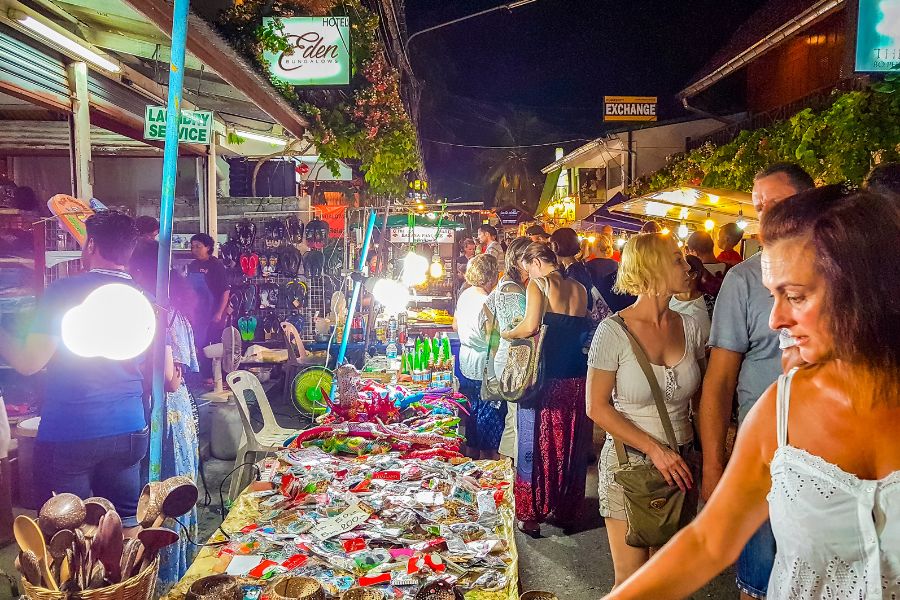
I’ve noticed more and more travel YouTubers making Koh Samui their home base, and I can see why. The island offers a balance that few other places do—a mix of peace and connectivity, local culture and Western comforts, all wrapped in a tropical setting that feels like a permanent vacation.
Conclusion
Koh Samui wasn’t part of my original plan, but it ended up being the perfect solution to my slowmad frustrations. I wanted a place where I could put down roots, but still feel free, and Koh Samui offered me that balance. Sure, it has its downsides—like anywhere in the world—but life is a compromise. And this one, Koh Samui, works for me.


